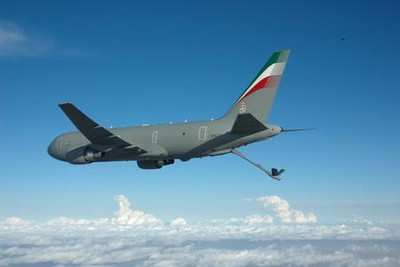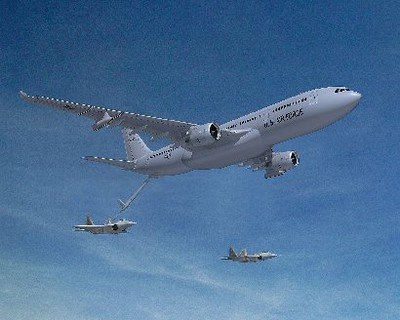Capitol Hill May Face Single Bid From Boeing
It may bring smiles to Boeing supporters, but Northrop Grumman's
potential withdrawal from an Air Force refueling tanker contact --
a widely-circulated story these past few weeks -- could force an
abrupt halt to the entire process.

This, according to Frank Cevasco, a defense analyst and former
Pentagon acquisitions official. Cevasco says a Northrop withdrawal
would not necessarily give the deal to Boeing as the default bidder
on one of the most lucrative and controversial military contacts in
history.
"If Northrop really does decide not to compete, the Air Force
could find its program stopped once again," said Cevasco. "There is
far too much taxpayer money involved to award a sole-source
contract to Boeing. In my view the Air Force is playing a dangerous
game that could backfire once more."
With the aura of the Boeing ethics scandal three years ago still
surrounding it, Boeing may have more hurdles to overcome. The
original contract that Boeing was awarded in 2004 was killed amid
revelations that Boeing hired key Air Force acquisitions officials,
who later admitted giving the company preferential treatment before
leaving the military.
A final call for bids to replace the KC-135 midair refueling
tanker is expected shortly from the Air Force. Thus far the
contract has only drawn interest from Boeing, and the international
team of Northrop and the European Aeronautic Defence and Space Co.,
majority owner of Airbus.
The initial $40 billion USAF contract is for 179 planes... but
that may be just the beginning, as the Air Force eventually wants
to replace its entire 530-plane tanker fleet. Whichever company
wins the initial bid wouldn't have a lock on more work... but it
would have the upper hand, according to the Associated Press.
Boeing would build its 767-based planes (shown above) at
its existing Everett, WA plant; the Northrop/EADS team would build
a modified version of the Airbus A330 airliner (below) in
Mobile, AL.
The Northrop/EADS team is threatening to withdraw, claiming the
military's criteria favor Boeing... even as the Air Force completes
its bidding requirements. If the specifications don't change to
reflect the Northrop plane's additional cargo and fuel capacity,
"then we feel we would not be competitive and we would not bid,"
said Northrop spokesman Randy Belote.
"It's truly a multi-role, multifaceted capability that we're
offering, and it's unfortunate that it's not being given an
opportunity to compete and to perhaps transform the way tankers are
used in the future," Belote said.
Even without the tumultuous history, many lawmakers feel it
would be a mistake to give Boeing the contract without
competition.
"It would be a huge loss to our defense capability to have only
one competitor for this aircraft," Sen. Jeff Sessions, R-AL, whose
hometown of Mobile could see 1,000 new jobs if Northrop/EADS gets
the project, told the AP. "There should be multiple bids so that
the Air Force gets the best price, the taxpayer gets the best
value, and the war fighter gets the most capable aircraft."
Senate Armed Services Committee members like Democratic Chairman
Carl Levin of Michigan and Sen. John McCain, R-AZ, also insist that
the proposal draw a true competition.

On the other hand, Washington Rep. Adam Smith, a member of the
House Armed Services Committee, rejected any notion that the
contract is tilted toward Boeing.
"If that's what the Air Force says they need, that's what the
Air Force needs. This is about as clear and transparent a process
as you could ask for," he said.
 Aero-News: Quote of the Day (04.28.25)
Aero-News: Quote of the Day (04.28.25) ANN's Daily Aero-Term (04.28.25): Decision Altitude (DA)
ANN's Daily Aero-Term (04.28.25): Decision Altitude (DA) ANN's Daily Aero-Linx (04.28.25)
ANN's Daily Aero-Linx (04.28.25) Airborne-Flight Training 04.24.25: GA Refocused, Seminole/Epic, WestJet v TFWP
Airborne-Flight Training 04.24.25: GA Refocused, Seminole/Epic, WestJet v TFWP Aero-News: Quote of the Day (04.29.25)
Aero-News: Quote of the Day (04.29.25)




